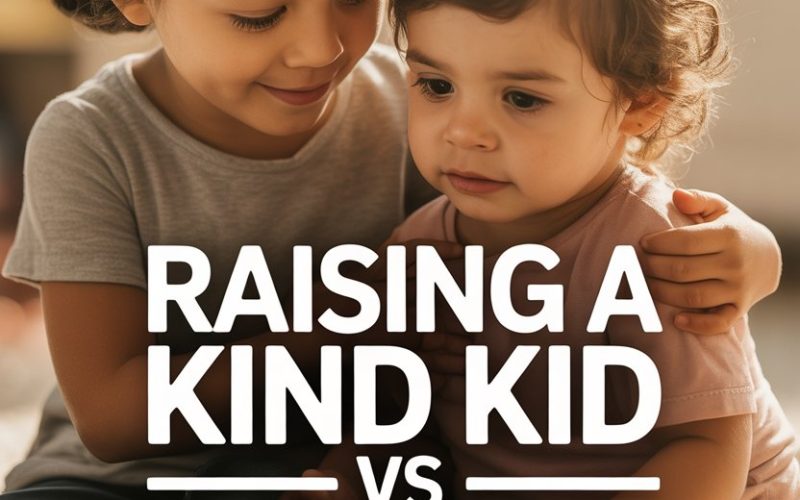If you’re a parent who’s ever cheered as your child shared a snack or comforted the new kid, you’re already hoping to raise a kind kid.
But every now and then, a little voice in your head wonders: Is my child just kind—or are they turning into a people-pleaser? The difference might look small, but it matters more than you’d think.
And yes, it’s absolutely possible to raise a child who is generous, empathetic, and considerate, without them morphing into the world’s smallest doormat.
Here’s how to spot the difference, encourage true kindness, and spare your child (and yourself) a heap of future therapy bills.
Kindness vs People-Pleasing: Do They Really Walk Into a Bar Together?
Both kindness and people-pleasing can look a lot alike from the outside. Sharing toys, helping friends, offering to swap seats on the bus—tick, tick, tick.
But dig a bit deeper.
A kind child helps because they want to. Their empathy drives their generosity.
A people-pleaser helps because they feel they have to. Their anxiety about others’ reactions (or their standing with grown-ups) powers every polite gesture.
The difference is intention. And intention, as anyone who’s been on the receiving end of a grudging “Sorry” knows, makes all the difference.
Why Are Kids So Prone to People-Pleasing?
Kids are hard-wired to seek approval. It’s how they survive toddlerhood, win stickers, and avoid the ultimate horror: a disappointed grown-up face.
Some children, due to temperament or upbringing, become especially tuned in to pleasing others. Maybe they’re especially sensitive.
Perhaps they’ve seen grown-ups light up when they’re helpful or quiet, or they’ve picked up on stress in the family and taken on the role of the “easy” one.
Sometimes, we accidentally train our children to people-please by over-praising compliance and squashing pushback. (Don’t worry, we’ve all been there. Who hasn’t longed for a little less “independence” at bathtime?)
Cultural factors play a part, too. Some families or communities place a premium on politeness and obedience; others value assertiveness and individuality.
As with most things, the trick lies somewhere in the middle.
How to Encourage Kindness Without Raising a People-Pleaser
Model Boundaries With Your Own Behavior
Children are world-class mimics. If you say “yes” to every PTA request, greet every favor with a smile (even as your left eye twitches), or apologize for things that aren’t your fault, your child is learning as they watch.
Show them what healthy boundaries look like in real time.
Use phrases like, “I’d love to help, but I can’t right now,” or, “I need a bit of quiet.” Let them see you say no—nicely.
And for extra credit, let them hear you not apologize for simply existing.
Talk About Why We’re Kind
It’s easy to default to “Be nice!” and call it a day. But kids benefit from understanding the why behind kindness.
At dinner or in the car, chat about what kindness means: “I noticed you helped your friend with her backpack. That must have made her day easier.”
Contrast that with people-pleasing behavior: “Sometimes we do things for others because we’re scared they’ll be mad if we don’t. It’s OK to say no if you don’t feel comfortable.”
Simple, clear explanations help children distinguish between acting from genuine care and acting from worry or fear.
Encourage Assertiveness and “No” Practice
Kindness doesn’t mean being a pushover. In fact, you can’t truly be kind to others if you’re never kind to yourself.
Give your child permission to say no, even to you. Let them practice: “No, I don’t want to play that game.” Or, “I need a break right now.”
It might sting a bit (especially when you’re proposing carrot sticks instead of biscuits), but you’re giving them a lifelong gift: the confidence to set limits.
A handy trick: Role-play tricky situations, such as a friend demanding a toy, or a cousin insisting on a hug. Offer phrases they can use: “No, thank you,” or, “I’d rather not.”
Praise the Choice, Not Just the Outcome
When your child does something generous, point out the thought process, not just the act.
Try, “You noticed your friend was sad and wanted to help. That’s really thoughtful,” instead of just “Good sharing!”
This reinforces that kindness comes from empathy, not from a knee-jerk need to please.
Likewise, respect when your child makes a choice not to comply for good reason. “You said you didn’t want to lend your favourite jumper today. That’s OK—you get to decide what you share.”
Watch Your Own Praise Traps
It’s tempting to gush over every polite word or selfless deed, but too much external praise can train kids to look outside themselves for validation.
Balance your compliments with curiosity: “How did it feel to help your friend?” or, “What made you decide to include that new student?”
Help them tune into their own sense of satisfaction, rather than just waiting for applause.
And don’t forget to praise assertiveness, too—even when it means they’re disagreeing with you. (Deep breaths. You’ve got this.)
Help Kids Notice Their Feelings
People-pleasers often learn to ignore their own discomfort. Encourage your child to notice when something feels off.
Ask, “Did you want to give your turn away, or did you feel like you had to?” Use gentle follow-ups: “What would you like to do next time?”
Sometimes a child can’t answer straight away. No worries. Just planting the question helps them start checking in with themselves, rather than auto-piloting their way through social situations.
Teach That You Can’t Please Everyone—and That’s Fine
Every playground, classroom, and family gathering offers a golden opportunity: disappointment. Someone will be unhappy, bored, or not get their way.
Instead of rushing in to fix things, let your child see that other people’s feelings are their own responsibility.
You can support your child through the discomfort—“I know it feels yucky when your friend is upset, but it’s not your job to make everyone happy.”
You might even share your own stories (embarrassing, preferably, for maximum effect): “I once said no to baking for the whole class, and Mrs Jones was grumpy for a week. But I didn’t have time, and that’s OK.”
Watch for Warning Signs of People-Pleasing
A little politeness never hurt anyone. But if your child:
- Always puts others first, even when they’re miserable
- Rarely expresses preferences
- Seems anxious about upsetting others
- Apologizes constantly
- Melts down after “holding it together” for others
…it might be time for a reset.
Don’t panic—plenty of grown-ups are still learning these lessons. (Looking at you, serial apologizers.)
Gently flag when you notice these patterns.
Work together on language: “You don’t have to say sorry for everything.” And consider chatting with their teacher to check if the pattern shows up at school, too.
What the Experts Say—and What the Research Shows
Parenting experts like Peter Gray, PhD highlight the importance of free play and self-directed choices for building autonomy and resilience.
Basically, letting your child direct their own interactions (with a watchful but hands-off approach) helps them learn both kindness and boundaries.
Likewise, studies such as this research on assertiveness and well-being have shown that children who practice saying “no” in safe environments tend to have higher self-esteem and stronger friendships.
Kindness and confidence go hand in hand. The trick is keeping them linked.
Handling Pushback From Family and Friends
Not everyone will be on board with your new, boundary-loving child. Auntie Jill might huff if she doesn’t get her usual hug. Grandad might mutter about “manners these days.”
Stick to your guns. Quietly explain to your child (and occasionally, the wider family) that they get to choose how to share their time and affection.
“We use kind words, but we don’t force hugs,” works wonders.
You can’t please everyone. Consider it an early lesson for everyone at the table.
When to Seek Extra Support
Most children swing between kindness and people-pleasing at different ages and stages.
But if your child seems especially anxious, withdrawn, or overwhelmed by social situations, a chat with a mental health professional never hurts.
Sometimes extra support helps children develop the confidence to stand up for themselves—and sometimes it gives us, the parents, a little extra backup, too.
Raising a Kid Who’s Kind—and Confident
No parent dreams of raising a pushover. The goal, after all, isn’t to create a child who says yes to everything—it’s to raise one who chooses kindness from a place of strength, not fear.
Help your child tune into their own feelings, say “no” when they need to, and care for others because they want to, not because they must.
That’s not just raising a kind kid. That’s raising a sturdy, happy one.
And frankly, the world could use a few more of those.





